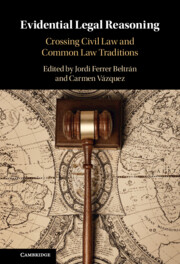Book contents
- Evidential Legal Reasoning
- Evidential Legal Reasoning
- Copyright page
- Contents
- Figures
- Tables
- Contributors
- Introduction
- Part I Evidence As an Area of Knowledge
- Part II Convergences between Systems
- Part III On Evidential Inferences
- 7 Group Deliberative Virtues and Legal Epistemology
- 8 On Probatory Ostension and Inference
- 9 Inferences in Judicial Decisions About Facts
- 10 Silence as Evidence
- 11 Sanctions for Acts or Sanctions for Actors?
- Part IV Expert Evidence
- Part V Standards of Evidence As Decision-Making Rules
- Index
- References
8 - On Probatory Ostension and Inference
from Part III - On Evidential Inferences
Published online by Cambridge University Press: 05 May 2022
- Evidential Legal Reasoning
- Evidential Legal Reasoning
- Copyright page
- Contents
- Figures
- Tables
- Contributors
- Introduction
- Part I Evidence As an Area of Knowledge
- Part II Convergences between Systems
- Part III On Evidential Inferences
- 7 Group Deliberative Virtues and Legal Epistemology
- 8 On Probatory Ostension and Inference
- 9 Inferences in Judicial Decisions About Facts
- 10 Silence as Evidence
- 11 Sanctions for Acts or Sanctions for Actors?
- Part IV Expert Evidence
- Part V Standards of Evidence As Decision-Making Rules
- Index
- References
Summary
This contribution discusses two theses on juridical evidence: the ostension thesis and the inference thesis. According to the former, the process of juridical proof typically requires some kind of ostensive act. In this sense, the evidence consists of some kind of element susceptible of being shown, or exhibited, or indicated to someone in a given context. According to the second thesis, the process of juridical proof necessarily requires inference. In this process, juridical evidence becomes the content of one or more inferences performed by the parties or by the fact-finders (judges or jurors). It can be the content of a premise which, together with other premises, leads to a conclusion about the disputed facts; or the content of a conclusion to which the premises lead. The two theses concern the process of juridical proof, but also the evidence involved in the process, since some characters of the process affect its content. Evidence is ostensively shown and inferentially processed.
- Type
- Chapter
- Information
- Evidential Legal ReasoningCrossing Civil Law and Common Law Traditions, pp. 138 - 158Publisher: Cambridge University PressPrint publication year: 2022
References
- 4
- Cited by

